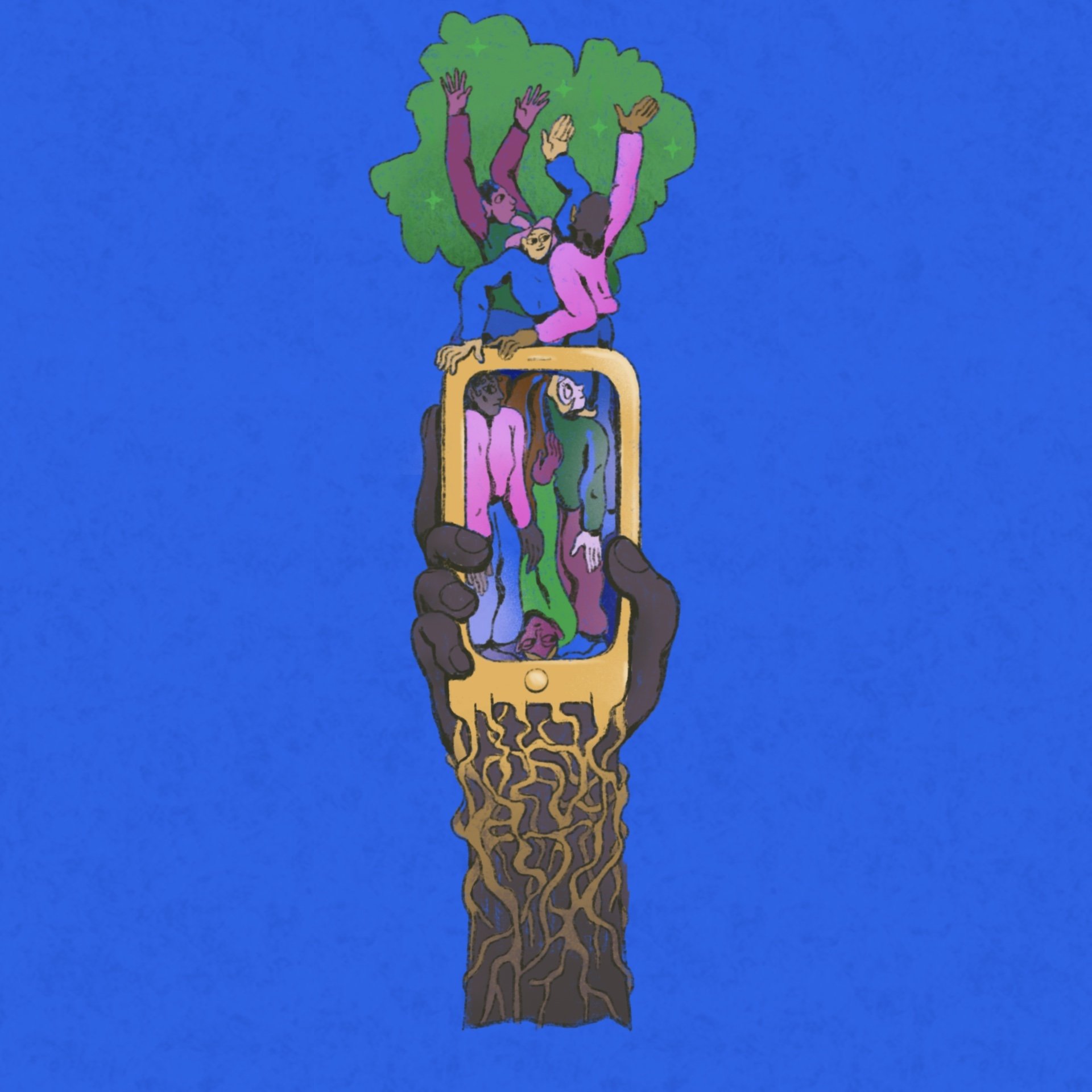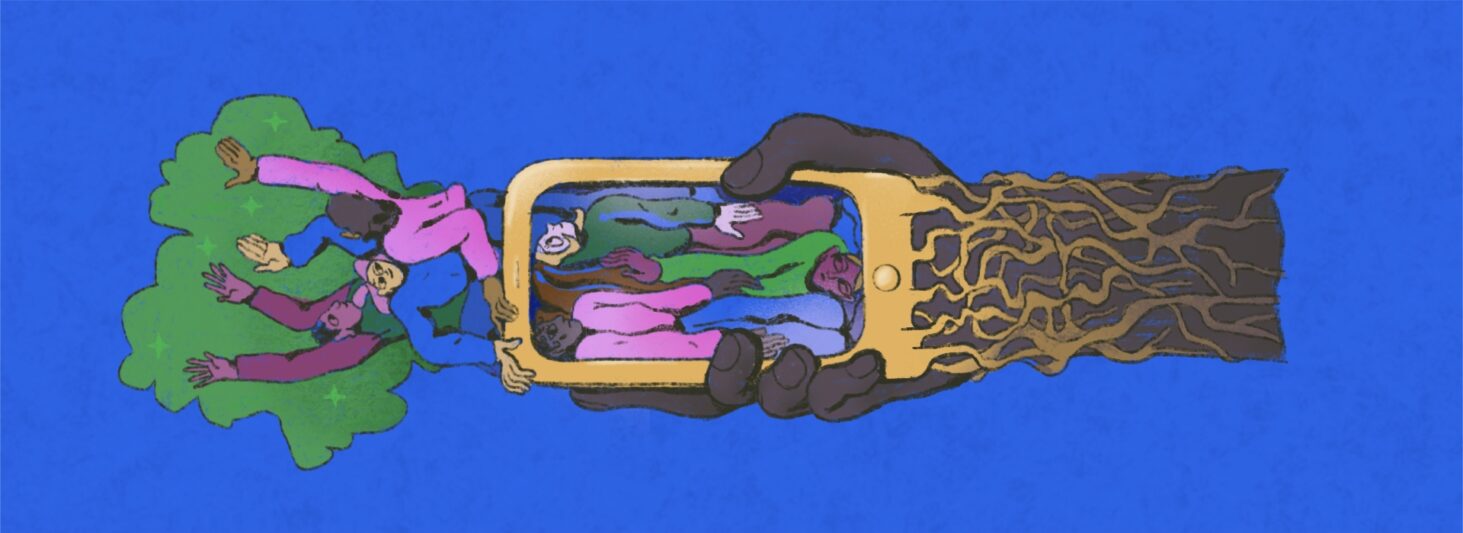Worrying about my phone addiction isn’t exactly groundbreaking. We all know that our little metal rectangles tether us to a brutal and complex supply chain: enslaved labour, rare Earth minerals mined by children, illegal land grabs, deforested landscapes, and ever-growing toxic e-waste dumping grounds. We seemingly accept that our dependence on these screens funnels vast amounts of wealth and power to a few reckless tech giants, who proudly meddle in democratic elections around the world.
With big tech’s frontiers of extraction now stretching from the mines of the DRC to the minds of 8 year olds, economist Yanis Vaourfakis argues we’re no longer living under capitalism, but in a system which much more resembles Europe’s medieval feudal system – we’re the peasants working the land for our giant tech overlords, for not much in return.
The demands of a modern working life, coupled with the breakdown of community structures, leaves us dependent on tech to do the menial task of staying alive in a hyper-individualised world. But why aren’t more of us trying to build structures to help us move away from it?
That’s how I found myself on the side of a hill on the French-Spanish border, feeding a wood stove kindling for three hours, trying to boil enough potatoes to feed 25 people. Can Decreix, or the House of Degrowth, is an off-grid, low-tech living lab with a clear mission: to live less, but with purpose.
Founded in 2011 by a group of activists and researchers frustrated with theoretical debates about our planet’s demise but lacking action, Can Decreix describes itself as a “centre for exploring, experimenting, and practicing organic agriculture and agroecology, eco-construction, and renewable energy, for research and activism around ideas of degrowth.” Here, simplicity isn’t just a lifestyle choice – it’s an intentional act of resistance against the overconsumption and technological dependence that dominate modern life.
Figuring it out
The community uses solar ovens in summer, harvests wood to fuel stoves that provide both heat and cooking, and grows food without chemical fertilisers or pesticides. Waste – from food scraps to waste water – is repurposed and reused, ensuring that nothing is squandered. Even cleaning products are homemade from plant matter, ash, and clay to keep chemicals out of the environment. At Can Decreix, the goal isn’t just surviving without high-tech gadgets but embracing the richness of simple, sustainable practices. Laundry is done with a repurposed bicycle. We scrubbed the oily crust off dishes using sand – surprisingly effective!
As François Schneider, one of Can Decreix’s founders, explains: “We didn’t know much at first, but we learned to live with low-tech solutions, tuning ourselves to the seasons. Every day, we keep learning.”
Their approach encourages a curious self-sufficiency, solving problems by using what can be repurposed. With reduced waste, solar powered electricity, a repair shed, and a sociocratic approach to collective decision making, Can Decreix has developed an iterative model of how to foster resilience and connection with the earth and each other. And as good as this sounds to me, it’s not exactly overrun.
“I think there’s still very little interest in finding out how it (low-tech) could work (in the wider world) because it’s disturbing for people.” Francois reflects. “It’s easy to design some solutions, but to live with it? To critique peoples way of life feels untouchable, because individual liberty is something we’re not supposed to challenge.”
Practicing Degrowth?
François is an intriguing figure. Originally an industrial ecologist, he became involved in the emerging degrowth movement in France in the early 2000s, during a time of protests for car-free cities, street meals, anti-advertising actions, and food cooperatives. It was a response to the contradiction of “sustainable development” – an acknowledgement that growth, even “green growth,” traps us in the same system of endless production and consumption, where resources and labour are exploited to ensure the wealth and power of the few.
It is a critique of a system that doesn’t work: global levels of production being the highest they’ve ever been yet 80% of the world’s population not meeting Decent Living Standards (a set of universal, irreducible and essential set of material conditions for achieving basic human wellbeing), even in the wealthiest countries.
Degrowth is a practice, a process, a school of thought. It recognises we have the resources and capacity to ensure a good quality of life for everyone on earth, our economy is simply organised in a way that won’t let us do so. François wrote papers, protested, and organised the first degrowth conferences. In 2004, he spent a year walking around France with a donkey to connect with people about degrowth ideas.
“In December 2011, I felt that we couldn’t just hypothesise about Degrowth. We have to get feedback from practice,” François explains how they came to set up Can Decreix. “We can’t wait around until we get the right theory that starts the revolution.” They were interested in experimenting with how we can live with radically less: less stuff, less tech, less work, and have a good life.
But putting theory into practice is complicated. Degrowth is a proposal for a new way of organising the world – one based on values of conviviality, dignity, balance, and care. Technological advancements are often offered up as the pathway to lessen workloads, streamline processes, and connect us across the globe, so in some way align with a degrowth vision of the future.
Others argue investment in technological innovation is our only way out of the climate crisis we find ourselves in: we need to electrify our energy usage, develop renewable technologies, carbon capture and storage, green hydrogen and make all our industrial processes more efficient. We need to geoengineer our atmosphere so sun rays are reflected back into space.

Techno-optimism is a colonial mindset
“There are lots of debates on what we do with innovation. Is Can Decreix about ‘going back to the old ways’ or embracing more innovative approaches?” Francois reflects.
Other degrowthers take a critical standpoint: techno-optimism does nothing for the crisis of global inequality. If we don’t address overconsumption in the Global North, technological advances – whether in clean energy or carbon capture – might only exacerbate global inequalities and environmental destruction. As prominent degrowth scholar Jason Hickel argues, clean energy alone won’t solve the climate crisis if it’s still tied to an economic model dependent on endless growth.
Scaling up renewable energy and clean technologies to deal with an infinitely growing economy also requires serious mineral extraction. A 2017 World Bank Report suggests in order for half the global economy to be decarbonised by 2050, we need 34 million metric tons of copper, 40 million tons of lead, 4.8 billion tonnes of iron and more. And where are these largely located? In the Global South.
The levels of extraction needed are confounding, and Hickle writes that “without precautions, clean energy firms could become as dangerous as fossil fuel companies.” Without reorganising the economy, the clean energy transition could redouble the power of the tech billionaire.
But tech is not inherently evil
Yet, let’s not throw the baby out with the bathwater. A huge barrier to environmentalism is the perception that the movement wants to take us back to the “dark ages”—to abandon all forms of technology and retreat into the woods. But 8 billion of us can no longer fit in the woods because we’ve cut half of it down.

Join our mailing list
Sign up for shado's picks of the week! Dropping in your inbox every Friday, we share news from inside shado + out, plus job listings, event recommendations and actions ✊
Sign up for shado's picks of the week! Dropping in your inbox every Friday, we share news from inside shado + out, plus job listings, event recommendations and actions ✊
Most people don’t have the luxury to forsake technology and retreat into the wilderness. We need to critique this vague environmental nostalgia for a “time when we were more connected with nature” as being innately better than now. It’s often tossed around so flippantly, glossing over the brilliant, life-saving medical technologies, the software that widens participation in education, work, and decision-making, and the technologies that have decentralized journalism away from elites.
I can speak to the appeal of a slower, more intentional life. At Can Decreix—an experience I fully acknowledge might feel like the “dark ages” to many—everyday tasks like cooking, foraging, and meal prep took on a more meaningful dimension. Doing these activities together, at a slower pace, was far more enjoyable than the solitary, rushed process of cooking alone in my flat after a long day. But there were drawbacks: stumbling up and down the rocky mountainside between the bunk and the kitchen made Can Decriex fully inaccessible to anyone with mobility impairments.
This doesn’t need to be an either/or. It’s not a binary choice. We can embrace living more communally without it coming at the expense of an accessible society. We don’t have to live in a pastoral utopia to slow down and live more intentionally.
Low-tech living doesn’t mean abandoning all technology
“We cannot completely get rid of high-tech today, but we need to put limits on it,” notes Francois. “10 years ago it was almost impossible to criticise computers for example, but slowly people are realising our attention is being stolen by these tools.”
How can technology serve us without dictating our every move? How can we live more meaningfully, divorced from serving our tech overlords, while retaining the necessary infrastructure for modern life? Can Decreix visions a future where innovation isn’t measured by cutting-edge electronics but by creative, frugal solutions rooted in nature. It is a place, as Francois repeatedly emphasises, for constant exploration.
For a lot of folks, it might be a bit too off grid, but it helped me understand my dependence on technology is intrinsically linked to feeling time-poor and overwhelmed. The kicker? To truly embrace a low-tech life, we need to work less – a point the degrowthers would definitely back.
What can you do?
-
- Visit Can Decreix or check out some of their recipes of low-tech to try yourself at home
- Read Less is More by Jason Hickel
- Check out LOW←TECH MAGAZINE
- For our Urban Dwellers, check out The case for … making low-tech ‘dumb’ cities instead of ‘smart’ ones
- Read more from my tech column HERE


